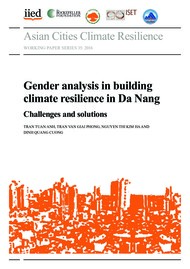A participatory approach to micro-resilience planning by community institutions

Climate change could severely affect cities, especially secondary cities in India, as they become the hub of livelihood opportunities, attracting rapid economic growth and growing population density from the neighbouring areas. Addressing climate change in urban areas requires building resilience to deal with the residual impacts of climate change. Urban climate change resilience can be defined as the ability to withstand and recover from the effects of climate change. Urban climate change resilience planning is closely linked to urban development processes. ~This paper focuses on a unique model created by Gorakhpur Environmental Action Group (GEAG) , an NGO working in Eastern Uttar Pradesh, as a micro-resilience plan against climate change in an urban context that uses participatory approaches and bottom-up development planning. In cities like Gorakhpur, situated in the flood-prone foothills of the Nepal Himalayas, the key urban systems, agents and institutions that enhance the risks of climate change impacts are linked to natural settings, behavioural patterns and weak governance. ~Top-down planning processes without residents’ participation largely ignore the local situation and the capacity development needed at the city level. Migration of rural populations in large numbers to urban areas adds new challenges to those faced by municipalities that are already struggling with limited resources and capacities to provide basic services to residents. This paper establishes the need ‒in cities such as Gorakhpur, which lack basic infrastructural facilities, where governance issues impede the course of development, where top-down functioning of government departments and local authorities are unable to deal with the local complexities ‒for active community participation and a bottom-up approach to building resilience to climate change, and documents this process.
Cite this publication
Available at https://www.iied.org/10656iied






